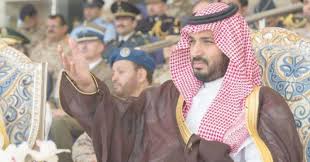If Saudi Arabia’s “2030 vision”, which was revealed on Monday, came up with more than a cure to the “oil addiction” as the Deputy Crown Prince Mohammed bin Salman said in his interview with “Al-Arabiya”, it would have been a historical incident not only for the Saudi economy but also for the Kingdom.
The Saudi Deputy Crown Prince surprised the citizens by announcing what was unexpected; Saudis can live in 2020 without the oil revenues.
Thus, the reform we are facing is real and it will change Saudi Arabia’s fututre, diversify its economic resources and limit the dependence on oil incomes gradually.
At the end, and according to Prince Mohammed, the “New Saudi Arabia” aims at transforming KSA into a model for the whole world to follow.
Moreover, it is obvious that these reforms are to be applied soon and Saudis will not have to wait long to verify the vision’s success, as the implementation and assessment are subject to strict procedures; thus ruling out the option of executive authorities failing.
It certainly is a difficult task for every assigned official, yet they have no other choice but to accept the challenge and move forward with what is required from them, as being late is not even an option.
On the other hand, there are many accumulated challenges Saudi Arabia is facing, as repairing the economic sector will undoubtedly affect both social and political sectors in the country.
In addition, years have proven that survival needs are the Arab citizens’ major concern; and whenever these needs are provided, other issues become a matter of luxury, not necessity.
Slackening in facing such challenges will make countering them even harder and will double their repair price, not to mention draining the Kingdom’s resources and
missing on chances to benefit from opportunities provided to help Saudi Arabia achieve a promising advancement among other countries.
Therefore, Saudi government is left with the choice of facing these challenges through its 2030 vision, and the executive authority will be put before a real challenge to translate this vision into plans that attain Saudis’ requirements.
In my opinion, these could be achieved through four provisional targets. The first is improving living standards for citizens and increasing the per capita in the Gross Domestic Product. The second is increasing the contribution of the private sector in the national economy. The third is raising the level of services provided for citizens, including education, health and social services. Finally, the fourth is raising the efficiency of government administration and developing it technically and humanly.
This is Saudi Arabia’s first to present an integrated development vision that can bring the country’s problems to an end. We may say that the project has arisen at the right time when the people are in need of a well-directed economic, instead of waiting too long without any roadmap to remove the obstacles, define the goals and explore the opportunities.
The objective of any reform in the world is the citizen, as any development misses this target is neither beneficial nor needed; and cannot be implemented or fruitful.
